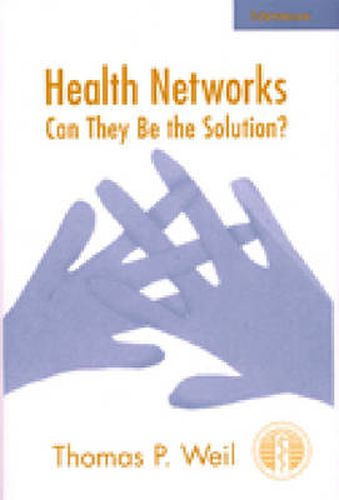Readings Newsletter
Become a Readings Member to make your shopping experience even easier.
Sign in or sign up for free!
You’re not far away from qualifying for FREE standard shipping within Australia
You’ve qualified for FREE standard shipping within Australia
The cart is loading…






Thomas P. Weil believes that the formation of health networks, or integrated delivery systems, represents a more sophisticated attempt to restructure America’s health system than those previously undertaken. He argues that this is so because integrated delivery systems require the application of established business principles and well-researched clinical acumen to the delivery of medical care services. This book evaluates whether recently formed health networks can generate enough fiscal savings to provide greater access to and quality of health care despite the current trend of cutbacks in reimbursement from Medicare and managed care plans. Unfortunately, most hospitals that have formed alliances with a previous competitor or nearby teaching facility have found that they are not yet achieving the savings originally forecast. Weil finds that these shortcomings often have been caused by the difficulties in achieving a strategic fit between two partners, in finding a middle ground when differences in culture and values surface, and in implementing operational efficiencies. The book concludes with a discussion of a number of ways in which networks might cut costs in the future. Health Networks will be of interest to medical practitioners and administrators, as well as to students in health services management programs. Thomas P. Weil is President, Bedford Health Associates, Inc., management consultants for health and hospital services.
$9.00 standard shipping within Australia
FREE standard shipping within Australia for orders over $100.00
Express & International shipping calculated at checkout
Thomas P. Weil believes that the formation of health networks, or integrated delivery systems, represents a more sophisticated attempt to restructure America’s health system than those previously undertaken. He argues that this is so because integrated delivery systems require the application of established business principles and well-researched clinical acumen to the delivery of medical care services. This book evaluates whether recently formed health networks can generate enough fiscal savings to provide greater access to and quality of health care despite the current trend of cutbacks in reimbursement from Medicare and managed care plans. Unfortunately, most hospitals that have formed alliances with a previous competitor or nearby teaching facility have found that they are not yet achieving the savings originally forecast. Weil finds that these shortcomings often have been caused by the difficulties in achieving a strategic fit between two partners, in finding a middle ground when differences in culture and values surface, and in implementing operational efficiencies. The book concludes with a discussion of a number of ways in which networks might cut costs in the future. Health Networks will be of interest to medical practitioners and administrators, as well as to students in health services management programs. Thomas P. Weil is President, Bedford Health Associates, Inc., management consultants for health and hospital services.